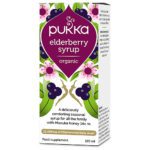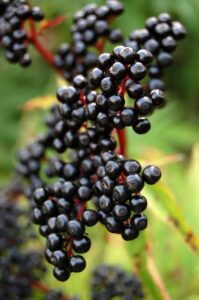




Elderberry Syrup100ml Pukka
£14.99
Out of stock
Email when stock available
Elderberry Syrup
Pukka Elderberry syrup is a popular herbal remedy made from the berries of the elderberry plant (Sambucus nigra). Elderberries have been used for centuries for their potential health benefits, and elderberry syp is a concentrated form of these berries. Here are some key points about elderberry syrup:
1. **Antioxidant Properties:**
– Elderberries are rich in antioxidants, particularly anthocyanins, which have been associated with various health benefits. Antioxidants help protect the body’s cells from damage caused by free radicals.
2. **Immune Support:**
– One of the most well-known uses of elderberry syp is for immune support. Some studies suggest that elderberries may help boost the immune system and reduce the duration and severity of cold and flu symptoms.
3. **Vitamin C and Other Nutrients:**
– Elderberries contain vitamin C, which is known for its immune-boosting properties. Additionally, elderberries provide other nutrients, including fiber, phenolic acids, and minerals.
4. **Anti-Inflammatory Effects:**
– The anthocyanins in elderberries also have anti-inflammatory effects, which may contribute to reducing inflammation in the body.
5. **Respiratory Health:**
– Elderberry is sometimes used to soothe respiratory symptoms, such as coughs and congestion. It may have mucolytic properties that help break down mucus.
6. **Cold and Flu Symptom Relief:**
– Elderberry is often used as a natural remedy for relieving symptoms of colds and flu, such as sore throat, cough, and fever.
7. **Antiviral Properties:**
– Some research suggests that compounds in elderberries may have antiviral properties, potentially inhibiting the replication of certain viruses.
8. **Caution and Dosage:**
– While elderberry is generally considered safe for most people, it’s important to use it in moderation. Excessive intake may lead to digestive upset.
– Pregnant or breastfeeding individuals and those with underlying health conditions should consult with a healthcare professional before using elderberry syp.
9. **Commercial vs. Homemade:**
– Elderberry is available commercially, and many people also make it at home. Commercial products are often standardized for consistency, but it’s crucial to choose reputable brands.
– If making elderberry at home, ensure that the berries are properly identified, as some parts of the elderberry plant can be toxic.
10. **Usage and Storage:**
– Elderberry is typically taken in small doses, and usage instructions may vary. It’s often recommended to take elderberry syrup at the onset of cold or flu symptoms.
– Store elderberry according to the product label or recipe instructions. Some preparations may require refrigeration.
11. **Interaction with Medications:**
– If you are taking medications or have underlying health conditions, it’s essential to check with your healthcare provider before incorporating elderberry into your routine, as it may interact with certain medications.
Elderberry is a popular and tasty way to potentially support immune health, but it’s important to approach its use with caution, especially if you have specific health concerns or conditions. Always consult with a healthcare professional for personalized advice.

















Reviews
There are no reviews yet.